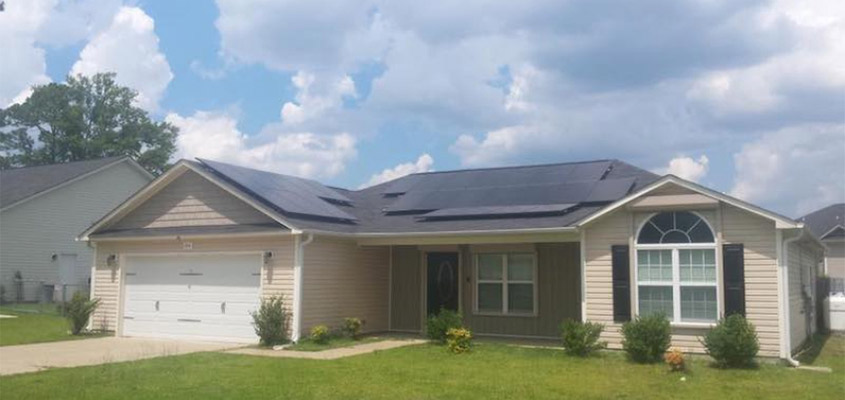North Carolina Readies for Home Solar Boom With new Duke Energy Rebate Program
Written by Chris Meehan
Updated March 31, 2020
4 minutes read
Categories: Solar incentives, Solar panels, Solar power, Utilities

Image source: Renu Solar, North Carolina solar installation
North Carolina already is the second largest state for solar power. Now rooftop solar is set to explode in the Tar Heel State thanks to the North Carolina Utility Commission's (NCUC's) approval of Duke Energy's new rebate program. The program, which was approved in April 2018, is expected to expand the use of distributed solar like residential and small commercial solar by up to 200 percent between now and 2022.
Under the new, $62 million program, initiated by the 2017 passage of the "Competitive Energy Solutions for North Carolina" law, Duke Energy will provide incentives for up to 20 megawatts of distributed solar a year. According to the commission ruling, "if in any year a portion of the incentives goes unsubscribed, the utility may roll excess incentives over into a subsequent year's allocation."
"Overall, NCSEA is very pleased and optimistic with the program approved by the commission. If properly implemented by Duke, we believe the rebate program will do much to open the rooftop solar market to residential, nonprofit, and business consumers," explained North Carolina Sustainable Energy Association (NCSEA) Spokesperson Allison Eckley.
Presently Duke Energy said it has more than 6,000 customers with private solar systems in North Carolina. Together they total 50 megawatts of distributed solar. By the end of 2022, the utility will likely have added 100 more megawatts of customer-owned solar power to its grid.
"The Competitive Energy Solutions law for North Carolina will encourage solar ownership for customers while we pursue a balanced and affordable energy mix for all customers," said David Fountain, Duke Energy's North Carolina president. "It also allows Duke Energy to secure solar energy from independent facilities at a market rate—also a benefit for customers."
How much can homeowners save?
While it's best to talk to a local solar installer to learn about all the details on potential savings and any additional incentive programs you can qualify for, Duke's incentives are across its entire service area in North Carolina. Under the new program, it is offering a 60 cents per kilowatt-hour rebate for rooftop solar systems up to 10 kilowatts in size, which would fetch a $6,000 rebate. Homeowners can install a larger system, but the rebate will only apply to the first 10 kilowatts.
The Duke Energy rebate is in addition to the 30 percent Investment Tax Credit (ITC) from the federal government. Between the ITC and the Duke Energy incentives it would more than half the average $29,400 cost of a 10-kilowatt system in North Carolina (using May 2018 estimates from solar-estimates.org), reducing it by $14,820 to $14,580—the cost of a small compact car. That's if a homeowner purchased a system outright.
Duke Energy said the typical 8-kilowatt rooftop array in North Carolina would be eligible for a $4,800 rebate. The $23,520 cost of such a system would be reduced to $11,475 when the rebates are accounted for.
Other options for going solar in North Carolina are now available
Under the new rebate program, Duke Energy Customers can also go solar under a leasing option with a third-party company. "We structured our program to give customers as much flexibility as possible to pursue renewable options," Fountain explained.
These types of arrangements are available in many states and can allow homeowners to go solar with little or no up-front costs. However, Duke Energy has not explained how rebates will apply to such customers.
In the commission's ruling it stated: "To receive a rebate payment following approval of a customer's application and installation of a customer-owned or leased solar photovoltaic (PV) system, the customer must submit to Duke a certificate of completion indicating that the installation is complete and confirming that billing under an eligible rate schedule and net metering rider has commenced."
Currently, customers in North Carolina are net metered at retail rates. As such they are compensated for excess energy their solar array puts back on the grid at the same rate as what they pay for it. Customers can also opt to sell all the power from their home solar system to the utility and be compensated for it. However, under the new law, Duke Energy must submit revised net-metering rates for the commission to approve.
The program also extends to businesses and non-commercial entities, like nonprofits and governments. Under the rebate, businesses can qualify for rebates of 50 cents per watt for a system with a maximum rebate of up to $50,000 for a 100-kilowatt system for commercial entities. Nonprofits, like churches and schools, receive an even higher rebate of 75 cents per watt and would receive up to $75,000 in rebates for a system up to 100 kilowatts or larger.
Under the new incentive program, Duke Energy will incentivize a full 10 megawatts of residential rooftop solar through 2022. The remaining 10 megawatts of incentives will be distributed between commercial entities and nonprofits. Fully 5 megawatts of incentives will be dedicated to non-profit organizations, which can include schools, places of worship, and so on, NCSEA reported.
As a result of the law, Duke Energy also is launching two other solar programs that will allow people and businesses to go solar. The Shared Solar program will allow customers to sign up for energy from a community solar farm for customers who can't or don't want to put solar on their residence. It also initiated the Green Source Advantage program that will allow large commercial customers to purchase solar power to offset the power they purchase from Duke Energy, according to NCSEA. The NCUC must still make a determination on both of those before consumers can start signing up for them.